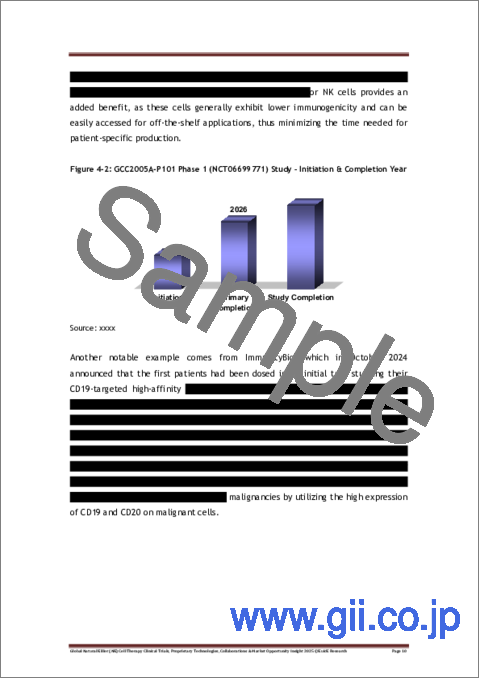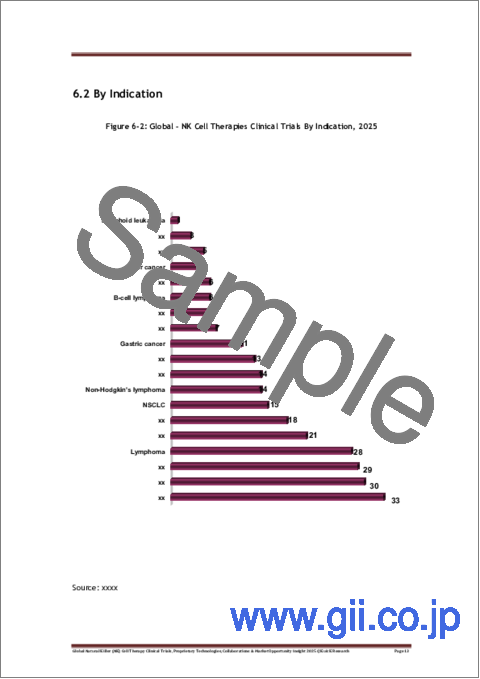|
|
市場調査レポート
商品コード
1691634
ナチュラルキラー(NK)細胞療法の世界市場:臨床試験、独自技術、共同研究、市場機会(2025年)Global Natural Killer (NK) Cell Therapy Clinical Trials, Proprietary Technologies, Collaborations & Market Opportunity Insight 2025 |
||||||
|
|||||||
| ナチュラルキラー(NK)細胞療法の世界市場:臨床試験、独自技術、共同研究、市場機会(2025年) |
|
出版日: 2025年03月01日
発行: KuicK Research
ページ情報: 英文 320 Pages
納期: 即日から翌営業日
|
全表示
- 概要
- 図表
- 目次
細胞療法は近年大きな進歩を遂げ、様々な疾患の治療法を変えてきました。中でもNK(ナチュラルキラー)細胞療法は、その可能性から大きな関心を集めています。当初はがん治療が中心でしたが、現在では自己免疫疾患のようながん以外の疾患にも応用されつつあります。NK細胞は、腫瘍や感染症に対する免疫システムの戦いにおいて重要な役割を果たしており、研究者たちは、有害な細胞を標的にして破壊するNK細胞の本来の能力を高めることに取り組んでいます。この分野はまだ発展途上であり、多くの治療法が臨床試験の初期段階にありますが、革新的な研究開発と増加する研究資金に支えられたNK細胞治療の急速な強化は、ヘルスケアにおける大きな変化を示唆しています。
NK細胞治療における最も注目すべき開発のひとつは、同種NK細胞への関心の高まりです。同種NK細胞は、健康なドナーに由来し、大量治療のためのスケーラブルな解決策を提供する、既製のものを使用することができます。これらの治療法は、がんだけでなく自己免疫疾患でも研究されており、その応用範囲の広がりを反映しています。例えば、Nkartaのような企業は、慢性自己免疫疾患である重症筋無力症などの疾患に対して同種NK細胞療法を進めており、NK細胞療法ががんと自己免疫疾患の両方に対する免疫療法の展望を再構築する可能性を示しています。同様に、SMT BioのSMT-NKは胆道がんを対象として評価中です。この治療法は、ペムブロリズマブのような免疫チェックポイント阻害剤とNK細胞を組み合わせて有効性を向上させるもので、NK細胞ベースの併用療法における重要な前進を示しています。
NK細胞療法の急速な進歩は、民間投資家と政府機関の両方からの強力な資金提供によって支えられています。例えば、2024年後半、Indapta Therapeuticsは、がんと自己免疫疾患に対する同種NK細胞療法IDP-023の臨床開発を支援するため、2,250万米ドルの資金を確保しました。この資金調達は、現在進行中の試験でデータを作成し、NK細胞療法の可能性をさらに追求するために極めて重要です。同様に、City University of Hong Kongは、小児の希少疾患である自己免疫性若年性皮膚筋炎を治療するためのCAR-NK細胞を開発するための政府助成金を受け取っています。このような資金提供は、がんだけでなく、他のさまざまな免疫介在性疾患に対するNK細胞療法への関心と投資が高まっていることを浮き彫りにしています。
結論として、NK細胞療法市場は大幅な投資と技術的進歩が進歩を促し、大きな成長期を迎えています。同種NK細胞への注目と、がんおよび自己免疫疾患の治療に対するその可能性は、免疫療法における有望な転換を意味します。戦略的共同研究、最先端技術、そして継続的な資金の流入は、NK細胞療法の開発を加速させ、様々な疾患に対する治療パラダイムを変革する可能性が高いとみられています。臨床データが次々と明らかになるにつれ、NK細胞療法市場は、従来の治療法では治療が困難であった疾患に対する斬新で即効性のある解決策を提供し、精密医療の将来において極めて重要な役割を果たすようになると予測されています。
当レポートは、世界のナチュラルキラー(NK)細胞療法市場について調査し、市場の概要とともに、薬剤動向、臨床試験動向、地域別動向、および市場に参入する企業の競合情勢などを提供しています。
目次
第1章 ナチュラルキラー(NK)細胞療法のイントロダクション
第2章 NK細胞療法の作用機序
- NK細胞の細胞傷害作用
- NK細胞療法の働き
- NK細胞療法のアプローチ
第3章 NK細胞療法の治療戦略
- NK細胞療法単独療法
- 複合剤としてのNK細胞療法
第4章 ナチュラルキラー(NK)細胞療法の研究開発動向(適応症別)
- がん
- 血液がん
- 固形がん
- 自己免疫疾患および炎症性疾患
- 微生物感染症
- 神経変性疾患
第5章 NK細胞療法の特徴強化アプローチ
- ナノテクノロジーの利用
- CARの改造
- CRISPR/Cas9遺伝子編集の使用
第6章 世界ナチュラルキラー細胞療法臨床試験の概要
- 国別
- 適応症別
- 患者セグメント別
- 相別
- 優先度別
第7章 企業、適応症、相別の世界ナチュラルキラー細胞療法臨床試験
- 研究
- 前臨床
- 第0相
- 第I相
- 第I/II相
- 第II相
- 第II/III相
第8章 NK細胞療法の独自のアプローチと技術の洞察
- 概要
- 企業独自の技術
第9章 NK細胞療法のためのパートナーシップと資金調達
- 最近のパートナーシップ、コラボレーション、ライセンシング契約
- 企業別資金調達取引
第10章 FDA指定を受けた研究中のNK細胞療法
- FDAファストトラック指定
- FDA希少疾病用医薬品指定
- 再生医療先端医療指定
第11章 NK細胞療法の市場動向と臨床試験の見通し
- 現在の市場動向、開発、臨床試験の評価
- 将来の商業化の機会
第12章 競合情勢
- Acepodia
- Beijing JD Biotech
- Cartherics
- Catamaran Bio
- Century Therapeutics
- City of Hope National Medical Center
- CRISPR Therapeutics
- CytoImmune Therapeutics
- Cytovia Therapeutics
- Dragonfly Therapeutics
- Editas Medicine
- Fate Therapeutics
- Gamida-Cell
- GC Biopharma/GC Lab Cell
- GICELL
- Glycostem
- HK inno.N
- ImmunityBio
- Karolinska Institute
- Kiadis Pharma
- Nkarta Therapeutics
- NKGen Biotech
- ONK Therapeutics
- Sanofi
- Senti Biosciences
- Shoreline Biosciences
- Sian Wuhan Medical Technology
- Smart Immune
- Sorrento Therapeutics
- Therabest Korea
- University of Texas M. D. Anderson Cancer Center
- XNK Therapeutics
- Zelluna Immunotherapy
List of Figures
- Figure 1-1: NK Cells - Identification & Discovery Timeline
- Figure 1-2: NK Cell Subsets - CD56low/dim v/s CD56bright
- Figure 2-1: Cytotoxic Action Of NK Cells
- Figure 2-2: CAR-NK Cells Preparation
- Figure 2-3: Delivery Of CAR Gene Into NK Cell
- Figure 2-4: NK Cells Sources For Therapy
- Figure 2-5: Structure Of CAR/TCR-NK Cell
- Figure 4-1: PRAME-TCR-NK Cells Therapy Phase 1/2 (NCT06383572) Study - Initiation & Completion Year
- Figure 4-2: GCC2005A-P101 Phase 1 (NCT06699771) Study - Initiation & Completion Year
- Figure 4-3: QUILT-106 Phase 1 (NCT06334991) Study - Initiation & Completion Year
- Figure 4-4: TAK-007-2001 Phase 2 (NCT05020015) Study - Initiation & Completion Year
- Figure 4-5: Indapta-Trial-1 Phase 1/2 (NCT06119685) Study - Initiation & Completion Year
- Figure 4-6: PRAMETIME-Mel Phase 1 (NCT06660420) Study - Initiation & Completion Year
- Figure 4-7: Ntrust-1 Phase 1 (NCT06557265) Study - Initiation & Completion Year
- Figure 4-8: Ntrust-2 Phase 1 (NCT06733935) Study - Initiation & Completion Year
- Figure 4-9: IDP023-2-101 Phase 1 (NCT06677710) Study - Initiation & Completion Year
- Figure 4-10: CALiPSO-1 Phase 1 (NCT06255028) Study - Initiation & Completion Year
- Figure 5-1: Improvements In NK Cell Therapy Using Nanotechnology
- Figure 5-2: Basic Structure Of CARs On NK Cell
- Figure 5-3: Gene Editing Tools
- Figure 6-1: Global - NK Cell Therapies Clinical Trials By Country, 2025
- Figure 6-2: Global - NK Cell Therapies Clinical Trials By Indication, 2025
- Figure 6-3: Global - NK Cell Therapies Clinical Trials By Patient Segment, 2025
- Figure 6-4: Global - NK Cell Therapies Clinical Trials By Phase, 2025
- Figure 6-5: Global - NK Cell Therapies Clinical Trials By Priority Status, 2025
- Figure 8-1: Artiva Biotherapeutics - Proprietary CAR-NK Cell Platform
- Figure 8-2: Artiva Biotherapeutics - Proprietary AlloNKTM NK Cell Therapy Scaling Platform
- Figure 8-3: Catamaran Bio - Proprietary Tailwind(R) Platform
- Figure 8-4: Cellularity - CYNK-CARs
- Figure 8-5: GAIA BioMedicine - Proprietary NK Cell Therapy Working Mechanism
- Figure 8-6: GAIA BioMedicine - Proprietary Technologies' Salient Features
- Figure 8-7: Gamida Cell - NK Cell Therapy Manufacturing Process
- Figure 8-8: HebeCell - Proprietary Scalable NK Cell Technology
- Figure 8-9: ImmunityBio - Proprietary haNK(R) Cell Structure
- Figure 8-10: Nkarta - Proprietary CAR-NK Cell Structure
- Figure 8-11: Nkarta - Proprietary NK Cell Therapy Platform
- Figure 8-12: Senti Biosciences - Gene Circuit Technology Platform
- Figure 8-13: Senti Biosciences - Gene Circuit Technology Platform Applicability
- Figure 8-14: Wugen - Proprietary Memory NK Cell Platform
List of Tables
- Table 10-1: Investigational NK Cell Therapies With Fast Track Designation
- Table 10-2: Investigational NK Cell Therapies With Orphan Drug Designation
- Table 10-3: Investigational NK Cell Therapies With Regenerative Medicine Advanced Therapy Designation
Global Natural Killer (NK) Cell Therapy Clinical Trials, Proprietary Technologies, Collaborations & Market Opportunity Insight 2025 Report Highlights & Findings:
- Global & Regional Market Trends By Indication
- First NK Cell Therapy Approval Expected By 2028
- Number Of NK Cell Therapies In Clinical Trials: >180 Therapies
- Highest Phase For NK Cell Therapies Clinical Trials: Phase II/III
- NK Cell Therapies Granted Fast Track & Orphan Status: > 5 Therapies
- Global Natural Killer Cell Therapies Clinical Trials By Company
Indication & Phase
- Insight On Recent Partnerships, Collaborations & Licensing Agreements
- NK Cell Therapies Proprietary Technologies By Company
- Monotherapy & Combinational Treatment Strategies
This Report Exclusively Examines Therapeutic Strategies That Employ Natural Killer (NK) Cells, Excluding Any Methods That Incorporate Antibody Engagers Intended To Bind To & Activate NK Cells.
Cell therapies have made significant progress in recent years, transforming treatment methods for a variety of diseases. Among these, NK (natural killer) cell therapies have gained considerable interest due to their potential. While they initially focused on cancer treatment, these therapies are now branching out to tackle non-cancerous conditions such as autoimmune diseases. NK cells play vital role in the immune system's fight against tumors and infections, and researchers are working to enhance their natural ability to target and destroy harmful cells. Although this field is still developing, with many therapies in early stages of clinical trials, the rapid enhancement of NK cell therapies, bolstered by innovative research and increasing funding, suggests a significant change in healthcare.
One of the most notable developments in NK cell therapies is the growing interest in allogeneic NK cells, which are derived from healthy donors and can be used off-the-shelf, offering a scalable solution for mass treatment. These therapies are being explored not only in cancer but also in autoimmune conditions, reflecting a broadening of their application. For example, companies like Nkarta are advancing allogeneic NK cell therapies for conditions such as myasthenia gravis, a chronic autoimmune disease, showing how NK cell therapy could potentially reshape the landscape of immunotherapy for both cancer and autoimmune disorders. Similarly, several companies are targeting specific cancers with engineered NK cells, such as SMT Bio's SMT-NK, which is being evaluated for biliary tract cancer. This therapy combines NK cells with immune checkpoint inhibitors like pembrolizumab to improve efficacy, marking a significant step forward in NK cell-based combination therapies.
The rapid advancement of NK cell therapies is being supported by robust funding from both private investors and government agencies. For instance, in late 2024, Indapta Therapeutics secured US$ 22.5 million in financing to support the clinical development of its allogeneic NK cell therapy, IDP-023, for cancer and autoimmune diseases. This influx of capital is crucial for generating data in ongoing trials, allowing for further exploration of NK cell therapy's potential. Similarly, the City University of Hong Kong received a government grant to develop CAR-NK cells for treating autoimmune juvenile dermatomyositis, a rare pediatric disease. This funding highlights the increasing interest and investment in NK cell therapies not just for cancer but also for a range of other immune-mediated conditions.
At the same time, collaborations between biotechnology firms and pharmaceutical giants are helping to drive clinical development. For example, Indapta Therapeutics partnered with Sanofi to explore the combination of IDP-023 with Sarclisa (isatuximab) for multiple myeloma. This collaboration underscores the importance of integrating NK cell therapies with other established treatments to enhance their effectiveness. By combining NK cells with existing monoclonal antibodies or chemotherapy regimens, these treatments could overcome some of the limitations seen with monotherapies. Additionally, innovative technologies such as nanomaterials and gene editing are being incorporated into NK cell therapy to enhance targeting precision and improve clinical outcomes. Nanoparticles are being used to stabilize NK cells and boost their ability to reach and eliminate tumor cells, offering an exciting new approach to improving the performance of these therapies.
To conclude, the NK cell therapy market is entering a period of significant growth, with substantial investments and technological advancements driving progress. The focus on allogeneic NK cells and their potential for treating both cancer and autoimmune diseases represents a promising shift in immunotherapy. Strategic collaborations, cutting-edge technologies, and the continued influx of funding will likely accelerate the development of NK cell therapies, transforming the treatment paradigm for a wide array of diseases. As clinical data continues to emerge, the NK cell therapy market is poised to play a pivotal role in the future of precision medicine, offering novel, off-the-shelf solutions for conditions that have historically been difficult to treat with conventional therapies.
Table of Contents
1. Introduction to Natural Killer (NK) Cell Therapy
2. Mechanism Of Action of NK Cell Therapy
- 2.1 Cytotoxic Action Of NK Cells
- 2.2 Working Of NK Cell Therapy
- 2.3 NK Cell Therapies Approaches
- 2.3.1 CAR NK Cell Therapies
- 2.3.2 TCR NK Cell Therapies
3. Treatment Strategies For NK Cell Therapies
- 3.1 NK Cell Therapy As Monotherapy
- 3.2 NK Cell Therapy As Combinatorial Agent
4. Natural Killer (NK) Cell Therapy Research & Development Trends By Indication
- 4.1 Cancer
- 4.1.1 Hematological Cancers
- 4.1.2 Solid Cancers
- 4.2 Autoimmune & Inflammatory Disorders
- 4.3 Microbial Infections
- 4.4 Neurodegenerative Diseases
5. NK Cell Therapy Characteristics Enhancement Approaches
- 5.1 Use Of Nanotechnology
- 5.2 Modifications In CARs
- 5.3 Use Of CRISPR/Cas9 Gene Editing
6. Global Natural Killer Cell Therapies Clinical Trials Overview
- 6.1 By Country
- 6.2 By Indication
- 6.3 By Patient Segment
- 6.4 By Phase
- 6.5 By Priority Status
7. Global Natural Killer Cell Therapies Clinical Trials By Company, Indication & Phase
- 7.1 Research
- 7.2 Preclinical
- 7.3 Phase-0
- 7.4 Phase-I
- 7.5 Phase-I/II
- 7.6 Phase-II
- 7.7 Phase-II/III
8. NK Cell Based Therapy Proprietary Approaches & Technologies Insight
- 8.1 Overview
- 8.2 Proprietary Technologies By Company
9. Partnerships & Funding for NK Cell Therapies
- 9.1 Recent Partnerships, Collaborations & Licensing Agreements
- 9.2 Funding Deals By Companies
10. Investigational NK Cell Therapies With FDA Designations
- 10.1 FDA Fast Track Designation
- 10.2 FDA Orphan Drug Designation
- 10.3 Regenerative Medicine Advanced Therapy Designation
11. NK Cell Therapies Market Trends & Clinical Trials Outlook
- 11.1 Current Market Trends, Developments & Clinical Trials Assessment
- 11.2 Future Commercialization Opportunity
12. Competitive Landscape
- 12.1 Acepodia
- 12.2 Beijing JD Biotech
- 12.3 Cartherics
- 12.4 Catamaran Bio
- 12.5 Century Therapeutics
- 12.6 City of Hope National Medical Center
- 12.7 CRISPR Therapeutics
- 12.8 CytoImmune Therapeutics
- 12.9 Cytovia Therapeutics
- 12.10 Dragonfly Therapeutics
- 12.11 Editas Medicine
- 12.12 Fate Therapeutics
- 12.13 Gamida-Cell
- 12.14 GC Biopharma/GC Lab Cell
- 12.15 GICELL
- 12.16 Glycostem
- 12.17 HK inno.N
- 12.18 ImmunityBio
- 12.19 Karolinska Institute
- 12.20 Kiadis Pharma
- 12.21 Nkarta Therapeutics
- 12.22 NKGen Biotech
- 12.23 ONK Therapeutics
- 12.24 Sanofi
- 12.25 Senti Biosciences
- 12.26 Shoreline Biosciences
- 12.27 Sian Wuhan Medical Technology
- 12.28 Smart Immune
- 12.29 Sorrento Therapeutics
- 12.30 Therabest Korea
- 12.31 University of Texas M. D. Anderson Cancer Center
- 12.32 XNK Therapeutics
- 12.33 Zelluna Immunotherapy






